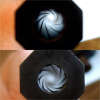scrat
Member
I use gun oil a whole bunch when putting them away. Have been using it for years. The day before i want to go shooting i run a couple of dry patches. then i run a patch soaked in some Jack Daniels. run it through the bore.... a little Jack for my barrels a little Jack for me. Well the Jack daniels cleans the heck out of the barrels. So next day im good to go.







